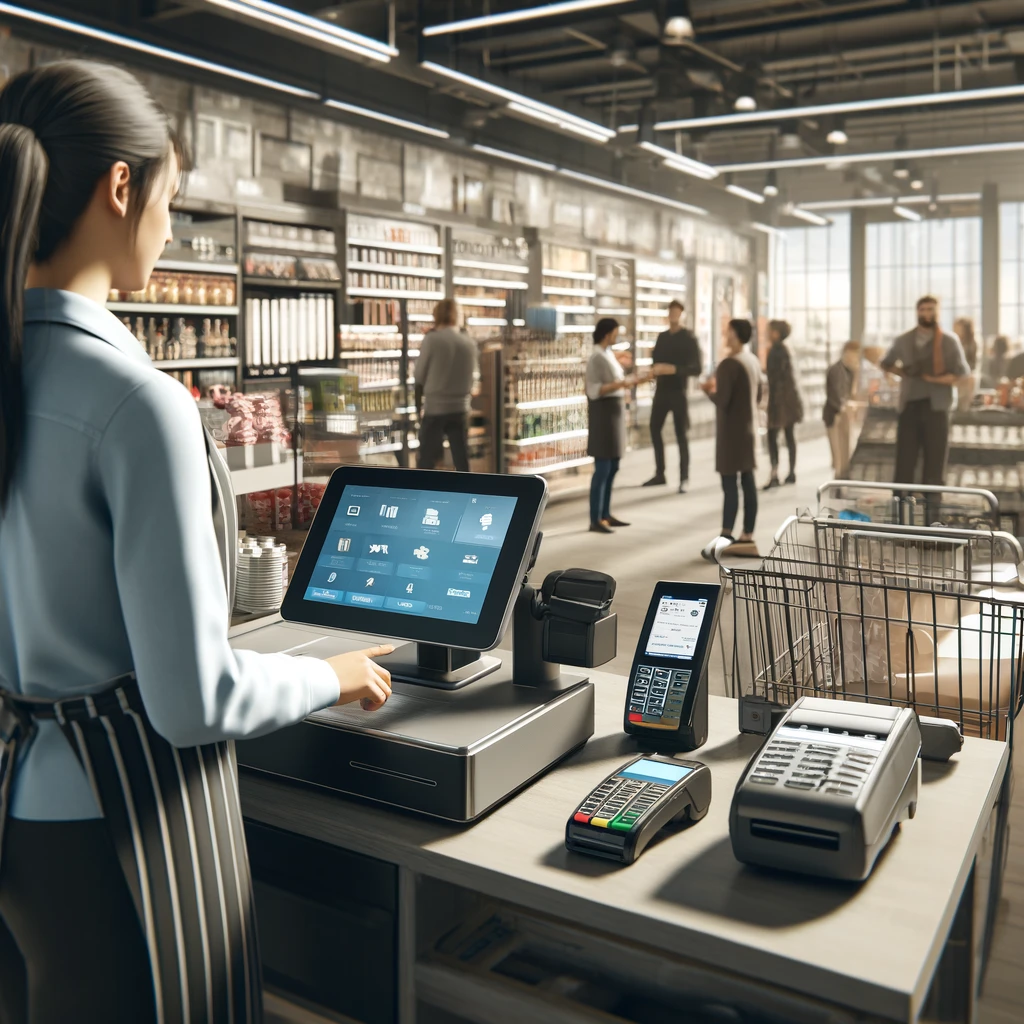Click here to visit our YouTube channel and be sure to like, subscribe, and comment to let us know what you think!
In the ever-evolving landscape of modern business, the point-of-sale (POS) system reigns supreme. It’s the beating heart of your customer interactions, the silent conductor orchestrating the flow of transactions. But with a plethora of options vying for your attention, choosing the right POS system can feel like navigating a financial minefield. Fear not, intrepid entrepreneur! This comprehensive guide will equip you with the knowledge and strategies to not just save money on a POS system, but to unlock its full potential and propel your business towards prosperity.
In the ever-evolving landscape of modern business, the point-of-sale (POS) system reigns supreme. It’s the beating heart of your customer interactions, the silent conductor orchestrating the flow of transactions. But with a plethora of options vying for your attention, choosing the right POS system can feel like navigating a financial minefield. Fear not, intrepid entrepreneur! This comprehensive guide will equip you with the knowledge and strategies to not just save money on a POS system, but to unlock its full potential and propel your business towards prosperity.
 The Siren Song of Savings: Understanding Your Needs
The Siren Song of Savings: Understanding Your Needs
Many businesses, especially those just starting their journey, fall prey to the siren song of upfront cost savings. While a budget-friendly price tag might seem enticing, it’s crucial to recognize that the cheapest option might end up costing you dearly in the long run. Here’s why:
- Hidden Fees and Surprise Costs: Beware of POS systems that advertise a low initial price but nickel and dime you with hidden fees for essential features like inventory management, customer relationship management (CRM), or integrations with other business applications. These seemingly insignificant charges can quickly add up, eroding those initial savings.
- Scalability Struggles: Your business is a dynamic entity, constantly evolving and adapting. A POS system that might seem adequate today could become a restrictive bottleneck tomorrow. Opting for a system that lacks scalability can force you to incur the expense of switching later, negating any upfront savings.
- The True Cost of Complexity: Some budget-friendly POS systems might lack intuitive interfaces or require extensive technical expertise to operate. This translates into wasted employee time spent grappling with complex functionalities. Consider the cost of training your staff on an intricate system versus the efficiency gains offered by a user-friendly POS solution.
Beyond the Dollar Sign: The Value Proposition of a Smart POS System
Instead of solely focusing on upfront costs, adopt a value-centric approach. A smart POS system can be a powerful tool that streamlines operations, boosts sales, and fosters stronger customer relationships. Consider the following benefits when evaluating potential POS systems:
- Efficiency Unleashed: Imagine a POS system that reduces transaction times, automates tasks like inventory management, and simplifies reporting. This translates into saved labor costs, improved employee productivity, and the ability to serve more customers.
- Data-Driven Decisions: Modern POS systems capture a wealth of customer data, painting a vivid picture of buying habits and preferences. This invaluable information empowers you to tailor marketing campaigns, optimize inventory levels, and personalize the customer experience for increased sales and customer loyalty.
- Inventory Management Magic: Never again face the frustration of stockouts or overstocked shelves. A smart POS system can track inventory levels in real-time, alerting you when it’s time to reorder and preventing costly product waste.
- Customer Connection Nirvana: A POS system that integrates with a CRM can revolutionize how you interact with your customers. Imagine remembering a customer’s name and purchase history, allowing you to offer personalized recommendations and build stronger relationships.
- The Power of Mobility: The modern business landscape thrives on flexibility. A mobile POS system empowers you to take your business anywhere, from bustling farmers markets to pop-up events. This broadened reach can translate into increased sales and a wider customer base.
Digging Deeper: Considerations for Every Business Type
While the core principles of choosing a smart POS system remain constant, specific considerations come into play depending on your business type. Here are some industry-specific insights:
- Retail Revelations: For retailers, inventory management is paramount. Look for a POS system that offers features like barcode scanning, real-time inventory tracking, and low-stock alerts. Integration with e-commerce platforms can also be a game-changer, allowing you to manage your online and offline presence seamlessly.
- Restaurant Renaissance: In the fast-paced world of restaurants, speed and efficiency are crucial. Consider a POS system with user-friendly interfaces that facilitate quick order processing and table management. Features like kitchen display systems and online ordering platforms can also significantly enhance your restaurant operations.
- Service Symphony: For service-based businesses, the focus might shift towards appointment scheduling, customer profiles, and integrated payment processing. Look for a system that allows for online booking and facilitates the management of client appointments and service packages.
Demystifying the POS Jungle: A Practical Guide to Shopping
Now, armed with a deeper understanding of value-driven selection, let’s delve into the practicalities of shopping for a POS system.
Here’s a roadmap to guide you through the process:
Your Needs Assessment

a voyage of self-discovery! Okay, perhaps “odyssey” is a tad dramatic, but a needs assessment is crucial. Carefully analyze your current business processes, identifying areas for improvement and pinpointing the functionalities that will streamline your operations. Consider factors like your transaction volume, the number of employees, and your future growth projections.
Embrace the Demo Dance: Don’t be shy about requesting demos from multiple POS system vendors. This is your opportunity to test-drive the system, evaluate its user-friendliness, and assess its suitability for your specific needs. Prepare a list of questions beforehand, focusing on features, integrations, scalability, and customer support options.
Beyond the Hype: Read Between the Lines While flashy marketing materials might trumpet a POS system’s bells and whistles, don’t get swept away by the hype. Focus on the technical specifications, ensuring the system integrates seamlessly with your existing software and hardware. Read user reviews and industry publications to gain insights into real-world experiences with different POS systems.
Security Matters: Building a Fortress of Trust In today’s digital age, data security is paramount. Choose a POS system that prioritizes customer information protection. Ensure it adheres to industry-standard security protocols and offers robust encryption measures.
The Total Cost of Ownership Equation: Remember, the initial price tag is just one piece of the puzzle. Factor in ongoing costs like monthly subscriptions, transaction fees, and potential training expenses. Some vendors might offer bundled packages that include hardware, software, and ongoing support, simplifying budgeting and cost management.
The Long-Term Tango: Choosing a Partner, Not Just a Product Think of your POS system as a long-term business partner, not just a one-time purchase. Consider the company’s reputation, customer support infrastructure, and track record of innovation. A reliable vendor with a proven commitment to ongoing product development and responsive customer support will be invaluable as your business grows and evolves.
A Symphony of Success
Choosing the right POS system isn’t just about saving money; it’s about investing in the future of your business. By prioritizing value over upfront cost, conducting thorough research, and selecting a system that aligns with your specific needs, you’ll unlock a world of possibilities. Imagine a POS system that streamlines your operations, empowers your employees, and fosters stronger customer relationships. This, my friend, is the true symphony of success waiting to be played in the heart of your business.
The Hidden Costs of “Free” POS Systems: A Cautionary Tale
While budget-conscious businesses might be tempted by the siren song of “free” POS systems, a closer look reveals a potential minefield of hidden costs and limitations. Here’s why a seemingly free option can end up costing you dearly in the long run:

The Transaction Trap: Some “free” POS systems hit you with transaction fees, essentially charging you every time a customer swipes their card. These seemingly small fees can quickly add up, especially for businesses with high transaction volumes. Carefully analyze the fee structure of any “free” POS system before diving in.
The Upgrade Enigma: As your business grows, you might find the limitations of a free POS system increasingly frustrating. Upgrading to a more feature-rich system often comes at a significant cost, negating any initial savings you might have enjoyed. Consider the long-term scalability of a POS system before opting for a free option that might hinder your future growth.
Security Blues: Free POS systems might not prioritize robust security measures. This can leave your customer data vulnerable to breaches, putting your reputation and customer trust at risk. A security breach can be a financial and legal nightmare, far outweighing any initial cost savings from a free system.
The Support Sphinx: When you encounter technical difficulties with a free POS system, don’t expect a dedicated support team to rush to your rescue. Many free options offer limited or non-existent customer support, leaving you to navigate complex issues on your own. This can lead to wasted time, lost productivity, and a surge in frustration.
The Freemium Gamble: Understanding the Nuances
Some POS systems offer a “freemium” model, providing a basic set of features for free with the option to upgrade to a paid tier for additional functionalities. While this can be an attractive option for businesses just starting out, it’s crucial to understand the limitations of the free plan and the true cost of upgrading. Carefully evaluate your needs and ensure the free tier offers the essential features you require to operate effectively.
Open-Source Options: A Path for Developers
For businesses with in-house technical expertise, open-source POS systems offer a unique path. These systems allow for greater customization and control, but require significant development resources to implement and maintain. Carefully weigh the benefits of customization against the ongoing costs of development and support before embarking on this path.
The Takeaway: Investing in Value, Not Just Price
While the allure of a free POS system is undeniable, the potential drawbacks can be significant. Remember, the best POS system for your business is not necessarily the cheapest, but the one that offers the most value in terms of features, scalability, security, and ongoing support. By investing in a smart POS system that aligns with your needs, you’ll not only save money in the long run, but also unlock a world of operational efficiency, customer satisfaction, and future growth.
The Core Features: Why They Matter Most
Arguably the most important core feature of a POS system, the one it absolutely must excel at, is transaction processing. This encompasses everything from seamlessly capturing customer orders and processing payments to accurately recording sales data. Here’s why it reigns supreme:
The Heartbeat of Business: Every sale is the lifeblood of your business. A POS system that fumbles transactions disrupts this vital flow. Imagine frustrated customers facing long lines due to sluggish processing, or incorrect order details leading to wasted inventory and unhappy patrons. Smooth, efficient transaction processing ensures a positive customer experience and keeps your business humming.
Data Integrity, the Foundation of Decisions: The data gleaned from transactions forms the bedrock of informed business decisions. A POS system that mishandles transaction data provides a distorted picture of your sales, inventory levels, and customer trends. This can lead to poor inventory management, missed marketing opportunities, and ultimately, lost profits. Accurate transaction processing ensures reliable data that empowers you to make strategic decisions for your business growth.
Security Matters: Trust is Paramount In today’s digital age, customer trust is paramount. A POS system riddled with security vulnerabilities during transactions exposes sensitive customer information like credit card details. This can lead to devastating financial losses, legal repercussions, and a damaged reputation. Secure transaction processing ensures customer information is protected, fostering trust and loyalty.

What Conclusions Can Be Drawn
From our conversation, we can conclude several key points about running a successful business and choosing the right point-of-sale (POS) system:
- Value Over Price: While budget is important, focusing solely on upfront cost for a POS system can be a false economy. A smart system that aligns with your needs will streamline operations, boost sales, and ultimately save money in the long run.
- Understanding Your Needs: A thorough needs assessment is crucial for choosing the right POS system. Consider your transaction volume, employee needs, and future growth plans to ensure the system scales with your business.
- Research is Key: Don’t be afraid to demo different POS systems and read user reviews to gain insights before making a decision. Pay attention to features, integrations, security measures, and customer support options.
- Invest in Security: Protecting customer data is paramount. Choose a POS system with robust security protocols and encryption to safeguard sensitive information.
- The POS System as a Partner: Think of your POS system as a long-term business partner. Select a vendor with a proven track record and a commitment to ongoing product development and responsive customer support.
- Transaction Processing Reigns Supreme: When it comes to core functionalities, smooth, secure, and accurate transaction processing is the foundation. This ensures a positive customer experience, reliable sales data, and protects sensitive information.
By prioritizing value, conducting thorough research, and choosing a POS system that aligns with your specific needs, you can empower your business to thrive in the ever-evolving landscape of modern commerce.

 The Siren Song of Savings: Understanding Your Needs
The Siren Song of Savings: Understanding Your Needs